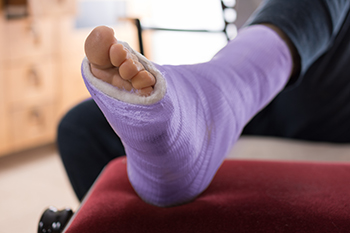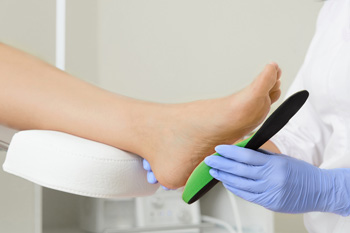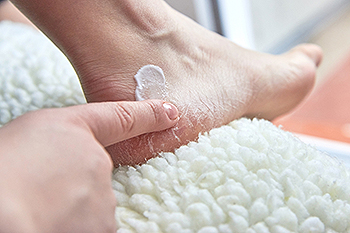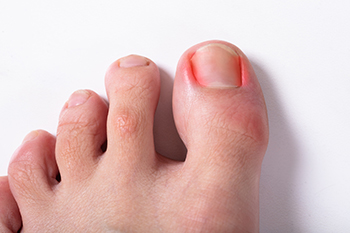Items filtered by date: October 2022
Foot Stress Fracture Symptoms

When an individual suffers a stress fracture, they essentially have developed tiny cracks in the bone, often due to repetitive or prolonged pressure. There are a number of different symptoms that are characteristic of a stress fracture. Namely, if you suffer from a stress fracture, you may develop bruising on the skin in the affected area. Typically, this might involve discoloration of some sort around the skin. The skin, for example, may appear to have a red, blue, or purple tint. Additionally, stress fractures may create poignant, localized pain at the site of the fracture. This pain can be worse when putting weight on the feet. Many individuals suffer from stress fractures—if you are one of them, consult with a podiatrist today.
Activities where too much pressure is put on the feet can cause stress fractures. To learn more, contact Harvey Jacobs, DPM from Quality Foot Care Center. Our doctor can provide the care you need to keep your pain free and on your feet.
Dealing with Stress Fractures of the Foot and Ankle
Stress fractures occur in the foot and ankle when muscles in these areas weaken from too much or too little use. The feet and ankles then lose support when walking or running from the impact of the ground. Since there is no protection, the bones receive the full impact of each step. Stress on the feet can cause cracks to form in the bones, thus creating stress fractures.
What Are Stress Fractures?
Stress fractures occur frequently in individuals whose daily activities cause great impact on the feet and ankles. Stress factors are most common among:
- Runners
- People affected with Osteoporosis
- Tennis or basketball players
- Gymnasts
- High impact workouts
Symptoms
Pain from the fractures occur in the area of the fractures and can be constant or intermittent. It will often cause sharp or dull pain with swelling and tenderness. Engaging in any kind of activity which involves high impact will aggravate pain.
If you have any questions please feel free to contact our office located in Somerset, NJ . We offer the newest diagnostic and treatment technologies for all your foot and ankle needs.
Gout Pain Can Be Managed
Benefits of Orthotics

Orthotics are worn inside shoes to correct various structural issues and treat medical conditions. Orthotics can be soft or rigid, both providing similar benefits. Soft orthotics are made with soft materials for extra cushioning. Rigid orthotics are made from harder materials, like carbon fiber or plastic. Orthotics can relieve foot and leg pain. Many symptoms requiring orthotics originate in the lower back and involve nerves that control function and movement in the legs and feet. Conditions causing foot and leg pain include a herniated disc, sleeping in an awkward position, or standing for prolonged times at work. Orthotics allow an individual to be able to maintain the correct alignment of the feet and legs, lessen pain, and prevent it from worsening. Orthotics can also help with managing minor foot deformities, absorbing shock from high-impact exercises, and correcting over-pronation, which is when the arch of the foot collapses inwards. If you think you might benefit from orthotics or want to know more about them, it is suggested that you consult with a podiatrist.
If you are having discomfort in your feet and would like to try orthotics, contact Harvey Jacobs, DPM from Quality Foot Care Center. Our doctor can provide the care you need to keep you pain-free and on your feet.
What Are Orthotics?
Orthotics are inserts you can place into your shoes to help with a variety of foot problems such as flat feet or foot pain. Orthotics provide relief and comfort for minor foot and heel pain but can’t correct serious biomechanical problems in your feet.
Over-the-Counter Inserts
Orthotics come in a wide variety of over-the-counter inserts that are used to treat foot pain, heel pain, and minor problems. For example, arch supports can be inserted into your shoes to help correct overarched or flat feet, while gel insoles are often used because they provide comfort and relief from foot and heel pain by alleviating pressure.
Prescription Orthotics
If over-the-counter inserts don’t work for you or if you have a more severe foot concern, it is possible to have your podiatrist prescribe custom orthotics. These high-quality inserts are designed to treat problems such as abnormal motion, plantar fasciitis, and severe forms of heel pain. They can even be used to help patients suffering from diabetes by treating foot ulcers and painful calluses and are usually molded to your feet individually, which allows them to provide full support and comfort.
If you are experiencing minor to severe foot or heel pain, it’s recommended to speak with your podiatrist about the possibilities of using orthotics. A podiatrist can determine which type of orthotic is right for you and allow you to take the first steps towards being pain-free.
If you have any questions please contact our office located in Somerset, NJ . We offer the newest diagnostic and treatment technologies for all your foot and ankle needs.
Cracked Heels and the Elderly

Throughout life, the soles of the feet bear the greatest force. The skin on the soles of the feet is thicker and has extra fat padding, but when it becomes dry it is prone to cracking. This is something that anyone can suffer from, but since padding on the feet gets worn and the gait changes due to age and disability, seniors are particularly prone to cracked heels. The condition can become serious, cause great discomfort, and hamper mobility. If one does not tend to the cracking, it can bleed and the chance of infections setting in is higher. Beyond dry skin, obesity, standing for long periods, and wearing open-back shoes can cause cracked heels too. Also, some diseases that can result in cracked heels include diabetes, peripheral arterial disease, and hypothyroidism. The key to treating cracked heels is reducing the pressure on the soles of the feet. Supportive, well-fitting shoes and heel pads may help. If you are elderly or caring for someone older, consult a podiatrist for advice on proper footwear as well as other remedies for cracked heels.
If the skin on your feet starts to crack, you may want to see a podiatrist to find treatment. If you have any concerns, contact Harvey Jacobs, DPM from Quality Foot Care Center. Our doctor can provide the care you need to keep you pain-free and on your feet.
Cracked Heels
It is important to moisturize your cracked heels in order to prevent pain, bleeding, and infection. The reason cracked heels form is because the skin on the foot is too dry to support the immense pressure placed on them. When the foot expands, the dry skin on the foot begins to split.
Ways to Help Heal Them
- Invest in a good foot cream
- Try Using Petroleum Jelly
- Ease up on Soaps
- Drink Plenty of Water
Ways to Prevent Cracked Heels
- Moisturize After Showering
- Skip a Shower
- Keep Shower Water Lukewarm
- Don’t Scrub Your Feet
If you are unsure how to proceed in treating cracked heels, seek guidance from a podiatrist. Your doctor will help you with any questions or information you may need.
If you have any questions, please feel free to contact our office located in Somerset, NJ . We offer the newest diagnostic and treatment technologies for all your foot care needs.
Can Ingrown Toenails Become Infected?

An ingrown toenail can be quite painful. It happens when the nail grows into the surrounding skin instead of over it. In severe cases, it may bleed and become infected, and it may be necessary to perform surgery for permanent relief. An ingrown toenail often affects the big toe, and in most cases, requires prompt medical treatment. Patients can experience symptoms that often include swelling, tenderness, and it may produce pus or fluid if it becomes infected. There are various reasons why people may notice an ingrown toenail developing. These can consist of wearing shoes that do not fit correctly, genetic reasons that can cause curved toenails, or if a toe injury has occurred. Relief may come from soaking the foot in warm water, followed by using a cotton swab to gently pull the skin away from the nail. This is considered to be a temporary fix until a podiatrist can be contacted. If you have developed this uncomfortable ailment, please make an appointment with this type of doctor who can effectively treat ingrown toenails.
Ingrown toenails can become painful if they are not treated properly. For more information about ingrown toenails, contact Harvey Jacobs, DPM of Quality Foot Care Center. Our doctor can provide the care you need to keep you pain-free and on your feet.
Ingrown Toenails
Ingrown toenails occur when a toenail grows sideways into the bed of the nail, causing pain, swelling, and possibly infection.
Causes
- Bacterial infections
- Improper nail cutting such as cutting it too short or not straight across
- Trauma to the toe, such as stubbing, which causes the nail to grow back irregularly
- Ill-fitting shoes that bunch the toes too close together
- Genetic predisposition
Prevention
Because ingrown toenails are not something found outside of shoe-wearing cultures, going barefoot as often as possible will decrease the likeliness of developing ingrown toenails. Wearing proper fitting shoes and using proper cutting techniques will also help decrease your risk of developing ingrown toenails.
Treatment
Ingrown toenails are a very treatable foot condition. In minor cases, soaking the affected area in salt or antibacterial soaps will not only help with the ingrown nail itself, but also help prevent any infections from occurring. In more severe cases, surgery is an option. In either case, speaking to your podiatrist about this condition will help you get a better understanding of specific treatment options that are right for you.
If you have any questions please feel free to contact our office located in Somerset, NJ . We offer the newest diagnostic and treatment technologies for all your foot and ankle needs.

